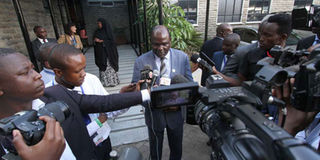Rows delay Wafula Chebukati arrival at sitting

IEBC Chairman Wafula Chebukati addresses journalists at County Hall, Nairobi after appearing before select committees of Parliament on October 5, 2017. PHOTO | EVANS HABIL| NATION MEDIA GROUP
What you need to know:
IEBC chairman Wafula Chebukati postponed his presentation when MPs insisted that he could not appear alone.
Insiders at IEBC said after the top officials agreed on the analysis, Mr Chebukati authored and signed off a letter that some members disagreed with.
The analysis, however, painted a different picture as the commission agreed with six of the 11 clauses, disagreed with two and partly agreed with three.
Differences within the Independent Electoral and Boundaries Commission delayed for hours its officials appearance at a joint sitting of parliamentary committees scrutinising bills to change election laws.
IEBC chairman Wafula Chebukati postponed his presentation when MPs insisted that he could not appear alone.
IEBC had presented two documents: a letter signed by Mr Chebukati and an analysis of the bills clause by clause, but lawmakers were not convinced that the documents had been agreed on by the commissioners.
Insiders at IEBC said after the top officials agreed on the analysis, Mr Chebukati authored and signed off a letter that some members disagreed with.
Mr Chebukati told the committees that the commission had a plenary meeting on Wednesday when the paper was presented.
LEGAL TEAM
“That document was given to the chairman and the legal team to purify. The insinuation that I am here representing myself is not proper. Every decision by IEBC is made by the plenary,” said.
The letter he had signed stated: “While the intention to amend some of the provisions of the Elections Act, 2011 are deserving and perhaps necessary, the Bill as crafted will occasion more confusion than it seeks to solve.”
The analysis, however, painted a different picture as the commission agreed with six of the 11 clauses, disagreed with two and partly agreed with three.
When they met the committee shortly after 9 pm last night, the commissioners stuck to the analysis in their presentation to the committee and made no reference to the letter signed by Mr Chebukati.
The commission agreed with the proposal to have another member appointed chairman in the absence of the chairman or his deputy, accepted another one on the nomination of presidential candidates and asked the MPs to make it clear that the results should be transmitted electronically and delivered physically.
PHYSICALLY DELIVERED
Mr Chebukati said that the provision on the chairman was in line with provisions in the Constitution for the Deputy President to act as the President in his absence and for the Deputy Chief Justice to swear in the President in the absence of the Chief Justice.
On the transmission, they however asked the committee to state that the results should be “physically delivered”.
They also added a provision that returning officers have the physically delivered results before they declare the results of an election.
It was also in agreement with a proposal to allow a complementary mechanism to identify voters, another to insulate results from being cancelled because of clerical errors, a definition of the procedure for a fresh election after an annulment and the proposed five-year jail term for officers who fail to fill result forms completely or submit incomplete forms.
SUPREME COURT
IEBC asked the committee to keep the provision that the chairman of the commission be a lawyer and qualified to be appointed Supreme Court judge and delete or amend the proposal to reduce the quorum of the commission.
But the apparent dispute within the commission exemplified by Mr Chebukati’s solo appearance overshadowed the documents submitted before the meeting at County Hall.
Members of the committees had caught wind of the divisions at the commission and questioned Mr Chebukati’s solo appearance before he could start his presentation.
Nairobi Senator Johnson Sakaja went first, pointing out that as a matter of procedure, Mr Chebukati should offer more than a verbal explanation.
“Can the chairman confirm that indeed he has a signed memorandum from the commission? We didn’t invite the chairman of the IEBC. We invited the Independent Electoral and Boundaries Commission,” said Mr Sakaja.
SIGNED DOCUMENTS
Mr Sakaja said the committee should only deal with signed documents and if not signed, to take it as a presentation by Mr Chebukati alone. ‘
When asked about the absence of others, Mr Chebukati said: “I speak for the commission and if you want the whole commission here, they can come.”
Other lawmakers agreed with him.
“We find it quite unusual, odd and even suspicious that the chairman is here only himself,” said Roysambu MP, Mr Waihenya Ndirangu.





